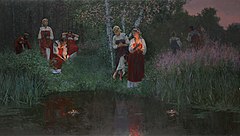Kupala
Script error: No such module "Draft topics". Script error: No such module "AfC topic". Script error: No such module "AfC submission catcheck".
 Comment: Polish Wikipedia has a source on the likely falsehood of this deityImmanuelle ❤️💚💙 (talk to the cutest Wikipedian) 08:31, 6 June 2023 (UTC)
Comment: Polish Wikipedia has a source on the likely falsehood of this deityImmanuelle ❤️💚💙 (talk to the cutest Wikipedian) 08:31, 6 June 2023 (UTC)
Some of this article's listed sources may not be reliable. (May 2023) (Learn how and when to remove this template message) |
This article's factual accuracy is disputed. (May 2023) (Learn how and when to remove this template message) |
This article may be expanded with text translated from the corresponding article in polski. (06 2023) Click [show] for important translation instructions.
|
| Kupala | |
|---|---|
| Lua error in Module:WikidataIB at line 665: attempt to index field 'wikibase' (a nil value). |
Kupala (Belarusian Купала, Russian Купала, Купало, Polish Kupała, Ukrainian Купала, Купало/Купайло) is a traditional goddess in Slavic mythology representing peace, water, magic and herbs, as well as fertility.[1] Her twin brother and male counterpart is Kupalo. Kupala and Kupalo, along with other gods, form aspects of a fertility deity.[1] The traditional festival of Kupala Night is dedicated to her.
History[edit]
In his book Deutsche Mythologie (1835), Jacob Grimm noted that Russians used the word kupala to describe the bonfires they lit at the summer solstice, and recorded that some people explained the word as the name Kupulo, a harvest god.[2] Although the word kupala (or kupalo) is usually explained as "bather" (from kupat(i) 'to bathe'), some scholars claim that it is not an epithet of John the Baptist, but a name of a pre-Christian Slavic deity, derived from some other root. According to Vyacheslav Ivanov and Vladimir Toporov, the name Kupala is derived from the same Indo-European root as the name of Cupid, Roman god of love, which means 'passion' or 'desire'.[3]
Etymology[edit]
Scholars now believe that the deity actually never existed, but was a back formation from Kupala Night.[citation needed] Kupala Is believed to derive from a past tense conjugation of *kǫpati meaning to bathe, possibly to baprtize in the name of John the Baptist.[4]

This holiday symbolizes the birth of the summer sun – Kupalo. In the 4th century AD, this day was proclaimed the holiday of the birth of John the Baptist – the forerunner of Jesus Christ. As a result of the Christianization of the pagan feast the name "Kupala" got connected with the Christian "Ivan".[5]
The Ukrainian, Belarusian name of this holiday combines "Ivan" (Joan/Johan/John, in this case John the Baptist) and Kupala which was thought to be derived from the Slavic word for bathing, which is cognate. However, it likely stems from the proto-Slavic kump, a gathering. The two feasts could be connected by reinterpreting John's baptizing people through full immersion in water. However, the tradition of Kupala predates Christianity. The pagan celebration was adapted and reestablished as one of the native Christian traditions intertwined with local folklore.[6] pl:Kupała (bóstwo)
References[edit]
- ↑ 1.0 1.1 Dixon-Kennedy, Mike (1998). Encyclopedia of Russian & Slavic Myth and Legend. p. 159. Search this book on

- ↑ Grimm, Jacob (1835). Teutonic Mythology. trans. James Steven Stallybras. p. 624. Search this book on

- ↑ Vyacheslav Ivanov, Vladimir Toporov. Kupala./В. В. Иванов, В. Н. Топоров. Купала. Мифы народов мира, М:Российская энциклопедия, 1994.
- ↑ "/culture_art/traditions". russia-ic.com/. Retrieved 31 October 2014.
- ↑ "Ivan Kupala Day". authenticukraine.com.ua. Retrieved 2022-05-19.
- ↑ "/culture_art/traditions". russia-ic.com/. Retrieved 31 October 2014.
This article "Kupala" is from Wikipedia. The list of its authors can be seen in its historical and/or the page Edithistory:Kupala. Articles copied from Draft Namespace on Wikipedia could be seen on the Draft Namespace of Wikipedia and not main one.

|
This page exists already on Wikipedia. |
